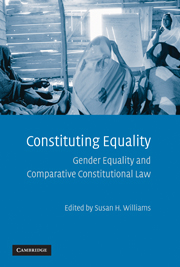Book contents
- Frontmatter
- Contents
- List of Contributors
- Acknowledgments
- CONSTITUTING EQUALITY
- Introduction: Comparative Constitutional Law, Gender Equality, and Constitutional Design
- SECTION ONE STRUCTURE
- SECTION TWO RIGHTS
- SECTION THREE CULTURE/RELIGION AND GENDER EQUALITY
- SECTION FOUR CONSTITUTIONS AND INTERNATIONAL LAW
- SECTION FIVE WOMEN IN THE PROCESS OF CONSTITUTION MAKING
- Conclusion: Gender Equality and the Idea of a Constitution: Entrenchment, Jurisdiction, and Interpretation
- Index
- References
Conclusion: Gender Equality and the Idea of a Constitution: Entrenchment, Jurisdiction, and Interpretation
Published online by Cambridge University Press: 26 October 2009
- Frontmatter
- Contents
- List of Contributors
- Acknowledgments
- CONSTITUTING EQUALITY
- Introduction: Comparative Constitutional Law, Gender Equality, and Constitutional Design
- SECTION ONE STRUCTURE
- SECTION TWO RIGHTS
- SECTION THREE CULTURE/RELIGION AND GENDER EQUALITY
- SECTION FOUR CONSTITUTIONS AND INTERNATIONAL LAW
- SECTION FIVE WOMEN IN THE PROCESS OF CONSTITUTION MAKING
- Conclusion: Gender Equality and the Idea of a Constitution: Entrenchment, Jurisdiction, and Interpretation
- Index
- References
Summary
As Katharine Bartlett has written, being a legal feminist entails “asking the ‘woman question’” in law. This essay asks the “woman question” about constitutions and constitutional law, largely with the purpose of generating areas for future research. I focus neither on particular subject areas nor on doctrinal issues, but rather on three areas of constitutional theory: the idea of constitutions as entrenched law under difficult-to-amend provisions, the allocation of jurisdiction in and among different levels and branches of government, and the idea of interpretive theory in constitutional law.
First, I want to acknowledge the wide range of subjects in and around constitutions that are amenable to analysis through the lens of gender. Women in many parts of the world now participate in constitution making – the title of a recent collection of essays, Women Making Constitutions, would have been almost inconceivable a century ago. As Vivien Hart notes, greater emphasis on participation in constitution making has in many countries offered opportunities for women to place their mark on and in constitutions. Many questions are embraced in this topic: How have women organized to participate? What have women sought to include in their constitutions? What have women disagreed about? What are the relationships among women's participation in constitution making, the constitutional texts that emerge, and the changed conditions for women in the years thereafter? How much do women participate as office holders, judges, and in other government positions under these constitutions?
Information
- Type
- Chapter
- Information
- Constituting EqualityGender Equality and Comparative Constitutional Law, pp. 312 - 350Publisher: Cambridge University PressPrint publication year: 2009
References
Accessibility standard: Unknown
- 1
- Cited by
